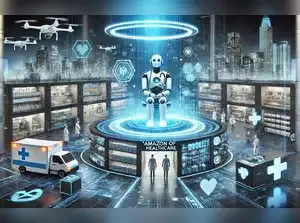In today's fast-evolving healthcare landscape, digital skills are no longer optional—they're a key advantage. The demand for healthcare professionals extends beyond traditional roles, creating opportunities in fields like telemedicine, medical research, health informatics, and biotechnology. Dr. Sandip Patel, senior healthcare consultant and founder of Docthub, highlights the shift in career trends: "Healthcare is no longer confined to hospitals and clinics. The rise of digital health platforms and AI-driven diagnostics has paved the way for technology-focused healthcare careers. Professionals who embrace these advancements will be better positioned for the future."
He also emphasises the importance of continuous learning: "The healthcare sector is evolving rapidly. Those who consistently update their skills and specialize in new areas will have the best career prospects in the years ahead."
Key digital skills for healthcare professionals
Healthcare professionals can improve their career prospects by acquiring the following digital skills:
Electronic Health Records (EHR) Management
Healthcare facilities use EHR systems to store and manage patient data. Professionals should be skilled in documenting, retrieving, and analyzing patient information efficiently. Understanding data security and compliance regulations, such as HIPAA for those working with US-based systems, is also crucial.
Telemedicine and Remote Patient Monitoring
In the era of telehealth, healthcare professionals ought to be acquainted with virtual consultation platforms. Training in how to conduct remote assessments, understand various patient data coming from wearable devices, and apply telemedicine as a complementary tool to conventional care will improve service delivery.
Data Analytics and AI Applications
Healthcare today is experiencing a paradigm shift owing to data-driven decision-making. There is a growing need for professionals who will analyse trends from patient data, forecast healthcare outcomes, and use AI tools. The applications of AI in diagnostics, treatment planning, and administrative automation are proliferating, making it worthwhile to understand these tools.
Digital Health Tools and Mobile Applications
Mobile health applications aid patients in managing their conditions and following prescribed treatments. These are the potential means through which healthcare professionals share with patients with such innovative technology as adopted by health fitness trackers, reminding patients for medication taking, and symptom checkers.
Awareness on Cybersecurity
With more and more patient information going online, the healthcare worker knows the possible risks posed by cybersecurity. Training to recognize phishing scams, use strong passwords, and ensure compliance with data privacy law can help prevent breaches while ensuring patient privacy.
Emerging Medical Technologies and 3D Printing
Latest innovations like prostheses, implants, organ models, and so forth use 3D printing. Medical professionals continue to learn about these advances to improve patient care and medical research.
Robotics and Automation in Healthcare
Robotic-assisted surgeries and AI have automated many activities in hospitals making them more efficient and bringing down human error.
Social Media and Digital Marketing for Healthcare
Medical professionals should consider this in their marketing strategy to make their name prominent while using digital channels to outreach their potential patients. Social media would also help them educate and tell the layman about the latest health happenings while establishing credibility.
Technology is shaping the future of careers in Health Care
Digitalisation in healthcare brings opportunities for careers to professionals who are investing in digital skills, and thereby patients are expected to benefit from such improved care. For one's own success in modern health care, one should adapt to the best technologies.
He also emphasises the importance of continuous learning: "The healthcare sector is evolving rapidly. Those who consistently update their skills and specialize in new areas will have the best career prospects in the years ahead."
Key digital skills for healthcare professionals
Healthcare professionals can improve their career prospects by acquiring the following digital skills:
Electronic Health Records (EHR) Management
Healthcare facilities use EHR systems to store and manage patient data. Professionals should be skilled in documenting, retrieving, and analyzing patient information efficiently. Understanding data security and compliance regulations, such as HIPAA for those working with US-based systems, is also crucial.
Telemedicine and Remote Patient Monitoring
In the era of telehealth, healthcare professionals ought to be acquainted with virtual consultation platforms. Training in how to conduct remote assessments, understand various patient data coming from wearable devices, and apply telemedicine as a complementary tool to conventional care will improve service delivery.
Data Analytics and AI Applications
Healthcare today is experiencing a paradigm shift owing to data-driven decision-making. There is a growing need for professionals who will analyse trends from patient data, forecast healthcare outcomes, and use AI tools. The applications of AI in diagnostics, treatment planning, and administrative automation are proliferating, making it worthwhile to understand these tools.
Digital Health Tools and Mobile Applications
Mobile health applications aid patients in managing their conditions and following prescribed treatments. These are the potential means through which healthcare professionals share with patients with such innovative technology as adopted by health fitness trackers, reminding patients for medication taking, and symptom checkers.
Awareness on Cybersecurity
With more and more patient information going online, the healthcare worker knows the possible risks posed by cybersecurity. Training to recognize phishing scams, use strong passwords, and ensure compliance with data privacy law can help prevent breaches while ensuring patient privacy.
Emerging Medical Technologies and 3D Printing
Latest innovations like prostheses, implants, organ models, and so forth use 3D printing. Medical professionals continue to learn about these advances to improve patient care and medical research.
Robotics and Automation in Healthcare
Robotic-assisted surgeries and AI have automated many activities in hospitals making them more efficient and bringing down human error.
Social Media and Digital Marketing for Healthcare
Medical professionals should consider this in their marketing strategy to make their name prominent while using digital channels to outreach their potential patients. Social media would also help them educate and tell the layman about the latest health happenings while establishing credibility.
Technology is shaping the future of careers in Health Care
Digitalisation in healthcare brings opportunities for careers to professionals who are investing in digital skills, and thereby patients are expected to benefit from such improved care. For one's own success in modern health care, one should adapt to the best technologies.








